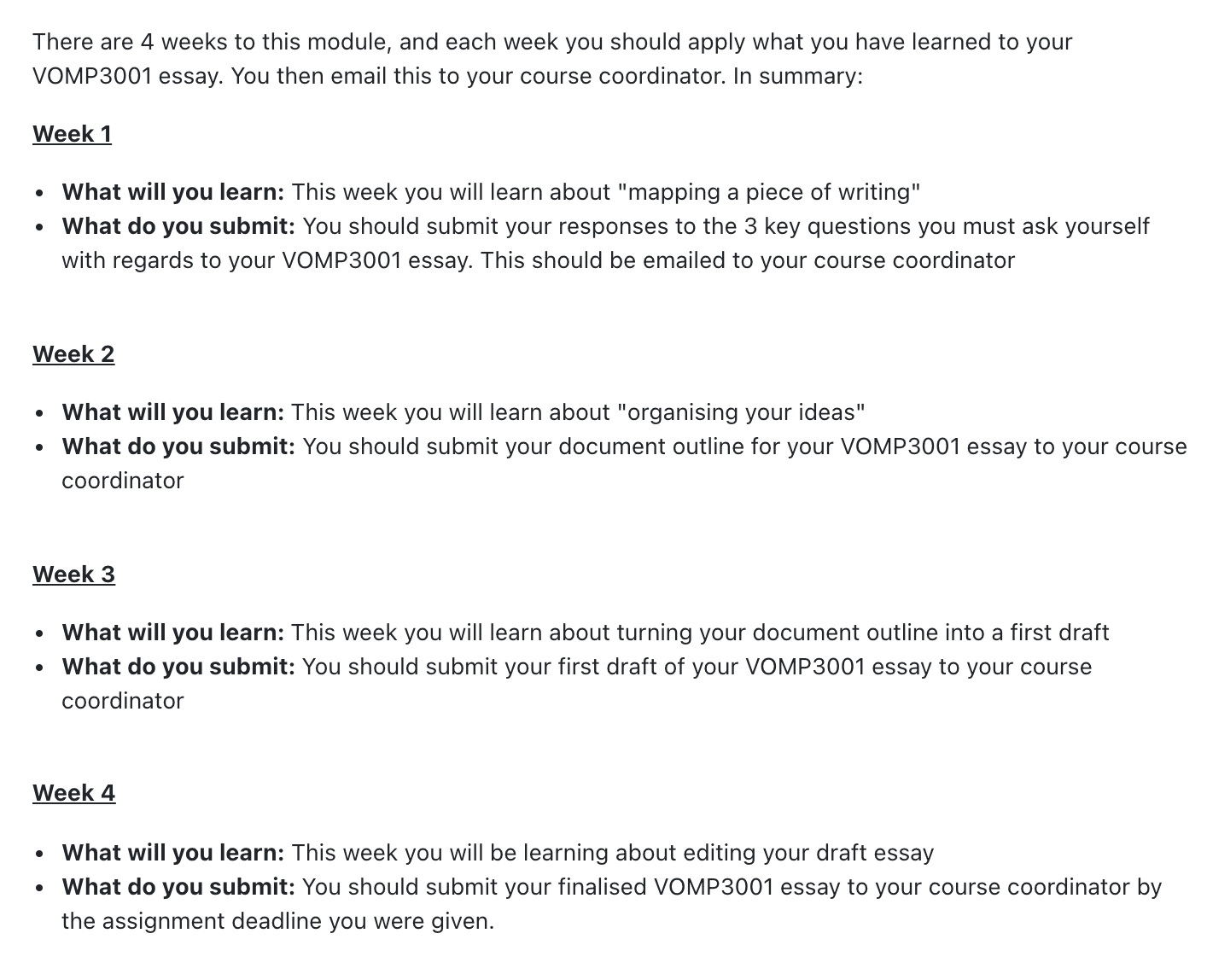Academic Writing Course
The GetReskilled Academic Writing Course – A Behavioural Science Approach
Table of Contents (click to the section you would like to read):
Overview of the Writing Skills Module
The Writing Skills module was designed to improve the students’ written communication skills and understanding of their responsibilities in academic writing.
The module covered how to plan an essay; how to organise ideas; how to draft and edit the piece of writing; how to build credibility in written communication through the use of behavioural science; how to gather information; and how to identify and judge a source’s credibility.
The online module (approximately 50 hours of study) was designed to be completed in conjunction with a technical module’s existing end-of-module assignment.
This allowed the students to apply the learnings immediately, where a direct benefit could be seen, and differs from the standard approach to teaching academic writing as stand alone. The theory for this decision was based in the findings of Dirksen, Colvin Clark, Stolovitch, and Keeps as:
- Procedural memory needs practice (Dirksen, 2016)
- When learning something new, new connections are formed in the students brain, and each time that new piece of information or skill is used, the connection is strengthened (Dirksen, 2016)
- The biggest improvement in a skill comes from the first few practices (Dirksen, 2016)
- Embedded retrieval hooks at the time of learning – opportunities that give the students real-life practise of using the information – make practising and using this skill easier (Colvin Clark, 2010)
- Therefore assessments that ask students to implement the information, have the greatest impact in the long term (Stolovitch & Keeps, 2011)
The module is based on the insights from the author’s previous research in this area, utilising tools from Behavioural Science to foster a positive environment for learners to explore referencing and building more credible arguments through the proper use of Subject Matter Experts (SME) opinions that support their own. The underlying layout of the module addressed the 4 key behavioural science traits surfaced in previous research.
Bounded Rationality – Suggest that humans are satisficers, not optimisers
Finding from Previous Research: Learners are impacted by the amount of information they have, their ability to process and apply the information, and the time they have to take action.
It is important to consider how to make sure the learner has the right amount of information in an easily processed format at the right moment.
How does the Writing Skills Module Address this:The learner is completing the module at the moment in which the learner needs the information (i.e. when they have an assignment to complete). The learner is therefore applying and actioning the information as they learn it. The information in the module is laid out in the order in which it is needed to write an essay (i.e. when the student is planning their essay, the module is teaching them about out to create a document outline)
Example: The syllabus follows a 4 step process (MODE – Mapping, Organising, Drafting, Editing)

The Framing Effect – Changing how we receive information changes our decisions
Finding from Previous Research: Referencing is framed in a negative light noting the severe consequences of getting it wrong rather than the benefits of getting it right.
How does the Writing Skills Module Address this: The module teaches referencing in the context of building credibility. The module explains that using SMEs adds weight to the students own arguments, resulting in potentially better grades. The module does not talk about the consequences of plagiarism but instead frames referencing as a tool to make the student’s life easier.
Example: Responsibilities around academic writing are taught as building credibility.
Building credibility – the messenger effect
The messenger effect – theory
Being a good messenger
Finding good messengers
Simplification Theory — We are more likely to act on a message if it is easy to understand
Finding from Previous Research: This could be a useful tool to teach students to utilise themselves, as being able to clearly and concisely discuss the work of an SME demonstrates a sound understanding of a topic
How does the Writing Skills Module Address this: The module starts teaching the learner the 3 key questions of any piece of writing (Who is my audience?, What is the purpose of my document? What points are needed to get my audience to the desired outcome?). The student is taught that answering these three questions is the bedrock on which the rest of the assignment is based.
Example: Understanding MODE and the 3 key questions of any piece of writing – Who is my audience?, What is the purpose of my document? What points are needed to get my audience to the desired outcome?
Introduction to MODE
Mapping & planning
Who is my audience?
What is the purpose of my document?
What points are needed to get my audience to the desired outcome?
The Messenger Effect – We are more likely to act on information that we get from an expert in the field
Finding from Previous Research: This could be a useful tool to teach students to utilise themselves, as properly acknowledging an SME who supports their argument gives greater weight to their assignment and potentially increases their grades
How does the Writing Skills Module Address this: The Messenger Effect is taught to the students in two sections – in how to build credibility in their own writing, and in how to identify and judge a source’s credibility. This is done through as simple pneumonic which the student then practises on their end of module assignment
Example:
Gathering information and judging a source’s credibility
Further Reading
This approach to teaching Academic Writing and Plagiarism comes from a series of papers in this area.
You might also be interested in: